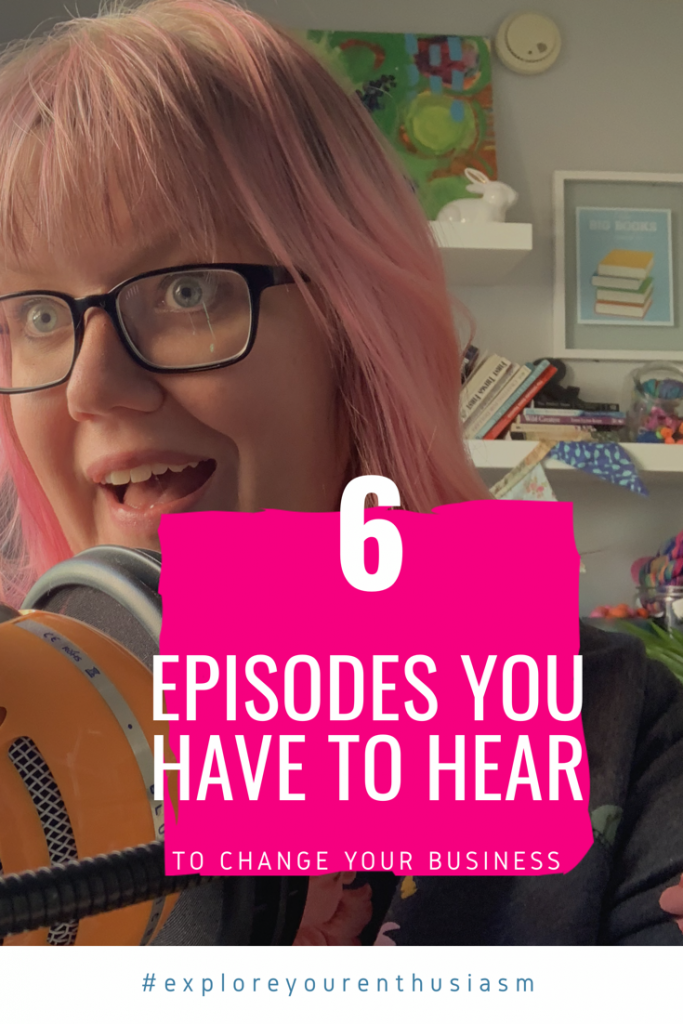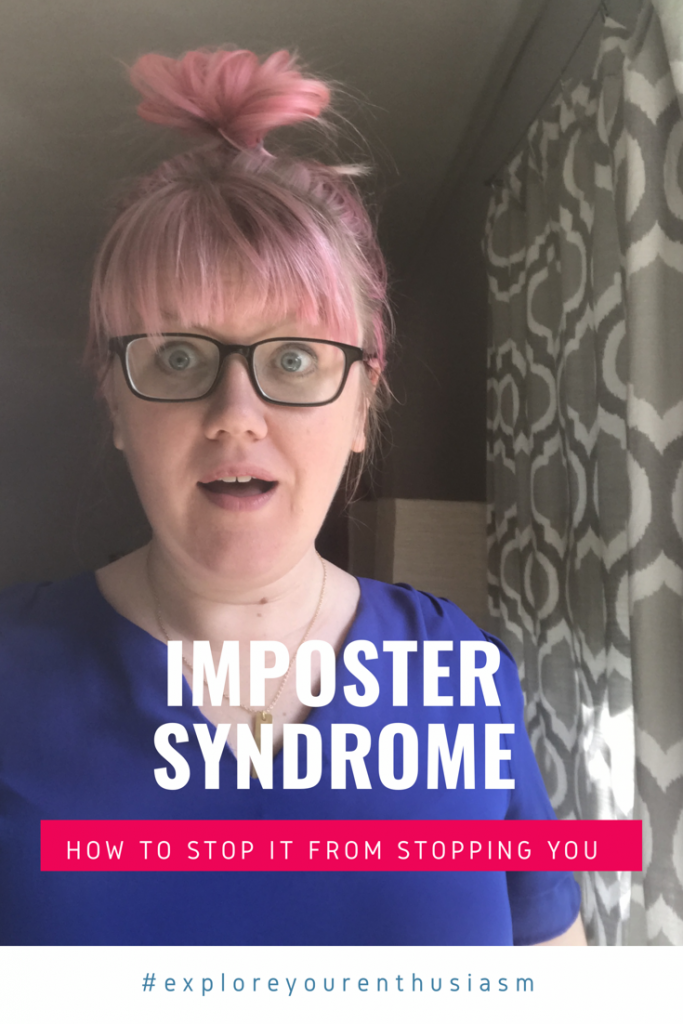Podcast: Play in new window | Download
Trust yourself about what direction to go.
Trust yourself about who you want to work with.
Trust yourself about what product to make, to launch, to go all in on.
A key element to building a business you actually LOVE and that fulfills you, is to TRUST YOURSELF. But how can you trust yourself through all the imposter syndrome, self-doubt and perfectionism? That's what we'll talk about today.
Trusting yourself and relying on your own intuition and sense of what to do is vital in creating a business you actually enjoy being in, so today we're going to talk about how to trust yourself. Before we dive in, you should know that I actually have a whole book planned about this topic, so we can't cover everything in one episode, but my goal is to help you start to trust yourself more, TODAY, even a little.
By the way, that book I mentioned, I'm thinking about actually writing it, IF it's something you, the person I create for, really want. So if you want a book about learning to trust yourself, go tell me at TaraSwiger.com/newbook. If there's enough interest, and you sign up there, I'll tell you about it before anyone else.
First, lemme define what I mean by “Trusting Yourself” – I mean, rely on your own sense, your own intuition, your own desires vs what other people tell you. Those other people might be your family, friends, your culture. They might be “experts”, teachers, podcasters! Or it may be the indirect messages you’re picking up from other people, like when you compare your business or life to someone else’s.
What I mean by “trust yourself” is, simply this: Recognize that you have your own goals, dreams, daily life and that you have your own skills, abilities, strengths, personality. Then, take all of that, and make decisions that are honoring this, that are a good fit for your life, your desires, your strengths.
In other words, instead of trying to do things the way you feel you “should” do them or the way other people tell you to, do things, from your daily business to your big goals, in a way that is based on YOU. YOU are the standard, not other people.
I can hear you say, but Tara, I can’t trust myself – Imposter Syndrome! Self-doubt! Perfectionism! Self-sabotage! I can't trust myself because I:
- Hold myself back
- Doubt my intuition
- Never think it's good enough
- Keep messing up instead of moving forward.
I know, and all of those reasons are why you need to get better at trusting yourself.
You see, those self-doubting thoughts aren't the reason NOT to trust yourself, they're showing up because you don't trust yourself.
Why don't you trust yourself?
You haven't been taught to trust yourself. You haven't been told you're allowed to and you haven't been taught how to do it.
In fact, you've been fed a steady diet of “you're not good enough” your whole life. Even if your parents were the best, most encouraging parents all the time, you still got the message that you needed to be better from teachers, from a zillion magazine articles about how to be hotter, smaller, smarter, less hairy, whatever. Or you read books or listen to podcasts that tell you that you need better habits, better morning routine, better consistency in social media.
And you see, a lot of those messages aren't wrong – if you can't do addition, you DO need to get better at addition before your teacher gives you an A. If you aren't consistent on social media, you do want to, well, you need to get better.
But there's an important distinction. You can need to DO something better, more consistently, more successfully, but that doesn't mean you first need to BE better.
Think about how you'd explain it to a kid. Yes, you need to get better at math. But that doesn't mean you're not already a good enough kid. You have all the internal worthiness you need, in order to get better at math.
This is about growth mindset. You can listen to episode 49 if you have no idea what I mean about mindset, but the short version is: A fixed mindset says that you are what you are and you can only do what you're already good at. (Which means that if you can't do something, YOU suck). Growth mindset says that you can learn anything, grow and change. So if you can't do something, you just need to learn it. You are still worthy and good and capable. There's a whole book about the research around fixed vs growth mindset, it's called Mindset by Carol Dweck and I go into this more in episode 49.
So you see, if you've been taking all the messages your whole life that tell you how to improve, and have looking at them with a fixed mindset, then you're right – how the heck can you trust yourself? You have no idea what you're doing!
But if you realize that you are capable of growth and change, then it is ok to both be imperfect and to trust yourself.
Ok, so you can trust yourself, but SHOULD you?
First, we gotta acknowledge that trusting yourself is not a sure path to easy, failure-free success. There is no way to get success without some failures. There is no easy, sure path to reaching your dreams – not trusting yourself, not following someone else’s rules.
I need you to really absorb that. You will have setbacks, you will have failures, you will have bad days no matter which path you choose.
So much of our “which choice is best” comes down to us trying to avoid failure. And of course! Failure sucks!
But as my biz mentor, Liz, told me, “I think you just need to become MUCH more comfortable with rejection and failure.”
Whew, that’s kinda hard, huh? I talk more about rejection and how to get comfortable with it in episode 171.
That’s the thing – in order to have success, you have to accept that you will make mistakes, that some things won’t go well, that you may be wrong.
If you’re going to experience setbacks either way, you may as well trust yourself, because you’re going to be more aligned, and more centered during it all.
You see, if you follow someone else’s path, or you try to make other people happy, or you try to push yourself into someone else’s box…you’re going to be miserable AS you move towards your goals. It’s going to be that much harder.
But if you give yourself some grace, if you find a way to do it that works for you, if you go after your OWN goals and not someone else’s, you’re going to enjoy the process. And it’s ALL process.
The benefit: You’ll keep going longer. When you try to make your biz or life fit someone else’s ideal, you get burnt out and you quit sooner. But if you’re going about it in a way that fits you, that focuses on your strengths, that gives you enthusiasm and energy, you’re going to keep going with it.
And that is the difference between “capital F” Failure and some small failures on your way to success: How long you keep going. Remember my dad’s advice to me when I quit my dayjob “You haven’t failed until you’ve quit.” So if you can find a way to do it in away that feels good, you’ll keep going past what feels like failures, you’ll find your way to your goals.
How do you start trusting yourself?
Ok, now that you know you can trust yourself despite self-doubt, despite setbacks and failures, how do you do it? Well, like I said, this is a much deeper topic, if you want to learn more go sign up at taraswiger.com/newbook. But let’s hit on some of the steps and how you can start exploring them:
- Get clear about what YOU want. You want to be sure you’re working towards goals that matter to you and not just goals you think you “should” want. I help you do this in Map Your Business – we look at the really big picture, and then break it down into a doable goal and then the steps you’re going to take to get to that first goal. If you’re not clear about where you’re going, it’s going to feel impossible to trust yourself.
- Explore and accept who you really are. A lot of the feedback I get about trusting yourself comes back to: I want to be different. I want to be better. But honey, you have to accept and embrace who you are, you have to start to find the value and worth in that, so that you see how trustworthy you are. This can start by exploring your personality and your strengths. This includes knowing how you respond to expectations (which I cover in ep 61 about the 4 tendencies), what motivates you (check out the Enneagram), and what your strengths are (I really like the strengthsfinder test and system, it’s backed up by tons of research). I’ve taught a lot about the 4 tendencies but not as much the other systems I use, lemme know if you want me to do podcast episodes on strengths and the Enneagram.
- Look at all the ways you are trustworthy. Trusting yourself and listening to yourself is a skill that you’ll get better at the longer you do it. You’ll build that skill in part by proving to yourself that your trustworthy. Do this by celebrating your successes – make a list of what you’ve already done and accomplished in your whole life. Have you made a sale? Set up a shop? Made one product? Kept a baby alive? Graduated? Make a big list, and even focus on the smaller stuff, especially that stuff you listened to your gut about.
- Keep showing yourself trustworth by showing up for yourself and your goals, every day. Every day that you work on your goals, that you listen to yourself, is building the muscle.
- Tap into that inner voice. I do this through journaling, you can do it by asking yourself questions, by paying attention to your feelings, through prayer or yoga or any number of ways. Start to pay attention to what you feel about a situation and then listen to it. You can start small or big, but make a note when you’re listening to yourself and then be sure to note down what the outcome was. I have sooo many examples of how you can start small, lemme know if you want to learn more about it!
It’s my hope that you realize you can take your strengths, your experiences, your knowledge, your curiosity, and use it all to pursue your biggest dreams, to make it happen. I help people work through this and am diving deeper in some Starship-only resources this year, so if you’d like to learn more both about how to set goals, follow through, improve your marketing and do it all while trusting yourself, sign up to be notified when the Starship opens again at Taraswiger.com/starshipbiz.
How to listen
- You can subscribe to it on iTunes (If you do, leave a review!)
- You can listen to it using the player above or download it.
- Subscribe or listen via Stitcher (or subscribe in whatever you use for podcasts – just search “Explore Your Enthusiasm” and it should pop up!).





